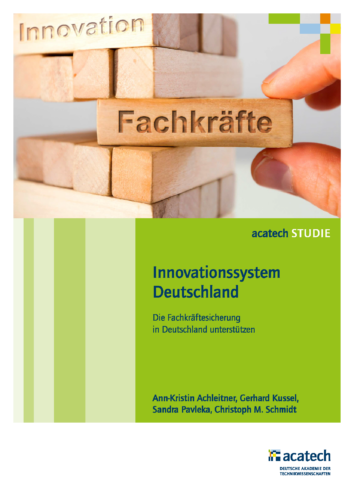acatech STUDY: Germany will only overcome the skills shortage with a culture change and more migration

Berlin/Munich, 20 June 2023
acatech STUDY The German Innovation System: Support in Securing Skilled Labour in Germany

The skills shortage is already a major challenge – indeed an existential threat for some businesses – and, on top of that, the baby boomer generation will soon be leaving the labour market. What can be done? A new acatech study assesses the possibilities presented by labour market participation, migration, digitalisation and education. Germany needs to bring about change in all four of these areas, and such change must involve the dismantling of legacy structures. To secure more foreign skilled workers, political commitment to economic migration is required, as is a bureaucratic culture that is service-oriented and enabling. To the study (in German)
In the first study in the series “The German Innovation System”, Christoph M. Schmidt (acatech Vice-President, RWI – Leibniz Institute for Economic Research) and Ann-Kristin Achleitner (acatech Vice-President, Technical University of Munich) focus on perhaps the greatest challenge facing Germany as a centre of innovation: the skills shortage.
The shortages we are currently experiencing are only the tip of the iceberg, as demographic change is insidious but inevitable. If we want to maintain and increase lasting prosperity in Germany as a centre of innovation and a place to do business, we must tap the labour force potential both at home and abroad now and stimulate flagging growth in labour productivity in a targeted way.”
Christoph M. Schmidt, acatech Vice-President, RWI – Leibniz Institute for Economic Research
The working group has explored four areas where action is needed using a science-based approach, involving discussions with more than 50 experts from science, business, trade unions and NGOs.
Labour market participation taps domestic reserves
Even though unemployment is low, job seekers should be actively supported to find employment. There is a lot to be gained by part-timers increasing their hours – but this is contingent on better childcare and care. At the same time, the growing cohort of older people should remain in the labour market for longer. To achieve this, more attractive possibilities for earning additional income while drawing a pension are required as well as societal debate about the retirement age. In general, more flexible forms of employment should make gainful employment more compatible with people’s diverse realities of everyday life.
Migration and integration will be essential
Our domestic reserves will not nearly be enough. Greater immigration of skilled workers will therefore be essential. To achieve this, Germany must become a more attractive country for migrants. Getting here and staying here must also be simplified. In particular, visa application and the recognition of professional qualifications must be streamlined, digitalised and centralised – by well-equipped, digitalised public bodies. Christoph M. Schmidt said, “A societal and political commitment to economic migration is needed, as is a bureaucratic culture that is service-oriented and enabling.” One thing in Germany’s favour is that foreign students already find the German system of free education attractive, so the obvious course of action is to attract them into the German labour market before they complete their studies.
Digitalisation and automation increase labour productivity
A shortage of workers and skilled labour can also be mitigated by having a digitally supported work environment, which makes for greater productivity. Hardly any progress has been made on this front. Key to improving productivity is the rapid establishment and expansion of the physical and digital infrastructure, the streamlining of data protection as well as the teaching of digital skills. Low-threshold support with digitalisation for small and medium enterprises would also be helpful. The state, too, can provide a catalyst for digitalisation: the federal government should provide identity services, standards and interfaces centrally that facilitate decentralised digitalisation of lower levels of government. The resources and skills required for this should be bundled centrally.
Enhance (further) education and training
Education and training are required for productive working and complement all other areas where action is needed. In particular, the teaching of fundamental skills to provide a good starting point must be enhanced. Equally important are teachers’ and students’ digital skills as well as the ability to choose the right career. Greater emphasis can be placed on these skills by having more practical content in the curricula and greater labour market transparency thanks to easy-to-understand trend reports on pay and employment. Lifelong learning should be specifically encouraged, especially in the case of individuals who tend not to participate in further education. Modularising education and training should facilitate international compatibility – foreign skilled workers would then only have to do the modules they haven’t yet completed in order gain their qualification in Germany. Concentrating educational and guidance offerings in one unified education platform also holds out the prospect of greater participation.
Germany must urgently accept the challenge
The German economy can only remain competitive in the context of international innovation if it has a solid foundation of skilled workers. The federal government has identified many of the challenges involved – but implementation is slow. “We will have to examine and change legacy structures,” said Christoph M. Schmidt. “Politicians and society will have to have difficult, uncomfortable conversations – about older people working, about managing migration and about fundamental reforms of the education system.”
Germany has to be the country that offers young and older people the best possible educational, professional and developmental opportunities, whether they were born here or moved here. I would like to thank the working group led by Ann-Kristin Achleitner and Christoph M. Schmidt for their thorough work. It shows that the German innovation system can only remain competitive and attractive if it has a solid foundation of skilled workers.”
Thomas Weber, acatech President
Further information
acatech STUDY The German Innovation System: Support in Securing Skilled Labour in Germany (in German)






